10 Best Happiness Books Of All Time That You Should Read – Highly Recomended
An expert panel meets annually to evaluate the level of happiness on the planet. On March 20, the International Day of Happiness, the outcome, the World Happiness Report, is made public.
This may sound like a good thing, but general happiness has been declining since 2005 while negative emotions like despair and anger have been increasing. What’s worse is the upward tendency in young people’s occurrence of mental illness, addiction, and related problems. This is understandable to a point.
With everything going on in the world these days, it might be difficult to maintain your mental stability. It makes sense that we can snap at the smallest challenge. However, we then feel awful for not understanding how to manage it and descend even further into misery.
We can learn about happiness from a variety of views by reading dozens of books. We can adopt a scientific, historical, philosophical, mindful, or spiritual point of view.
1. the art of happiness by dalai lama
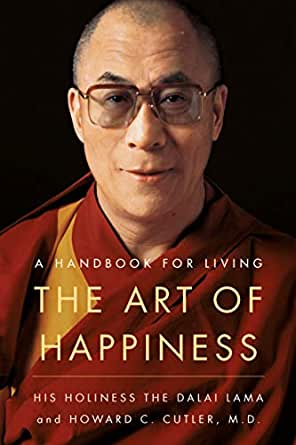
Mind Boggling Quote
“When life becomes too complicated and we feel overwhelmed, it’s often useful just to stand back and remind ourselves of our overall purpose, our overall goal. When faced with a feeling of stagnation and confusion, it may be helpful to take an hour, an afternoon, or even several days to simply reflect on what it is that will truly bring us happiness, and then reset our priorities on the basis of that. This can put our life back in proper context, allow a fresh perspective, and enable us to see which direction to take.”
A little overview
This book was actually written by Dr. Cutler, a psychiatrist, based on conversations he had with His Holiness the Dalai Lama over the course of a week.
This book explains how readers might find the same serenity as the Dalai Lama, a Nobel Peace Prize recipient who is known for his own feeling of peace.
In “The Art of Happiness,” Buddhist monk Tenzin Gyatso, commonly known as the Dalai Lama, presents his teachings from a “western” (i.e., science-based) perspective. It gives a general summary of Tibetan Buddhism and the Dalia Lama’s teachings.
The Dalai Lama’s direct quotations are a major aspect of the book. What then are the Dalai Lama’s philosophical teachings on happiness?
According to this book, happiness is what makes life worthwhile. Happiness is more the product of the mind than of events, conditions, and circumstances once a person’s basic requirements have been satisfied.
The reason you should read this book
The Dalai Lama offers some advice on how to achieve happiness. He tells his audience to focus on the things that bring them joy and do away with the ones that bring them pain. The Dalai Lama further claims that by acquiring mental tranquilly in this manner, we can turn away from material possessions and pursue serenity and a sense of inner value.
Everyone has the capacity to do this, according to the teachings. It also puts out the notion that having compassion is a mental condition characterised by nonviolence, nonharming behaviour, and nonaggression. According to the Dalai Lama, it is necessary to have compassion for everyone and to recognise that everyone has the right to be free from suffering.
2. the happiness advantage by shawn achor
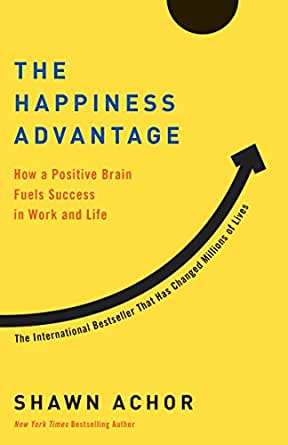
Best Quote To Read
“Constantly scanning the world for the negative comes with a great cost. It undercuts our creativity, raises our stress levels, and lowers our motivation and ability to accomplish goals.”
The reason you should read this book
According to Shawn Achor’s research, the traditional wisdom that success and hard effort bring happiness is false. According to science, he has determined that success comes after achieving happiness. This book suggests a number of ways you can start living a happier life right away.
“Without action, knowledge is often meaningless.”
3. Authentic happiness by Martin E.P. Seligman
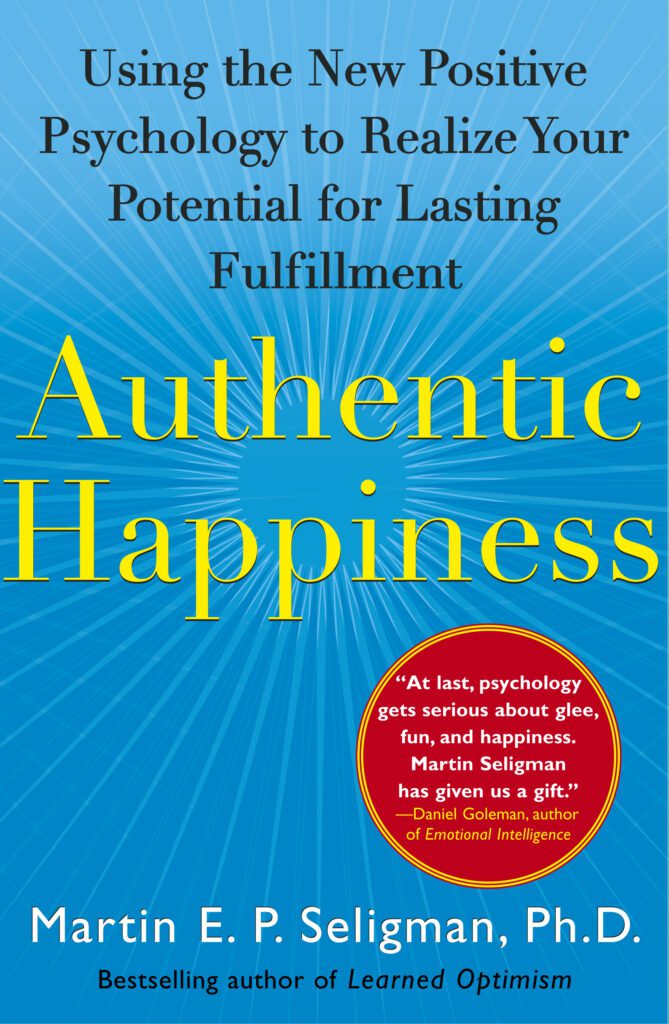
Best Quote From This Book
“Depression is now ten times as prevalent as it was in 1960, and it strikes at a much younger age. The mean age of a person’s first episode of depression forty years ago was 29.5, while today it is 14.5 years. This is a paradox, since every objective indicator of well-being—purchasing power, amount of education, availability of music, and nutrition—has been going north, while every indicator of subjective well-being has been going south. How is this epidemic to be explained?”
The reason you should read this book
According to psychologist and best-selling author Martin Seligman, being happy is not the result of “having the correct genes” or “being lucky.”
Seligman contends that focusing on one’s strengths as opposed to perceived faults is what leads to real happiness, also known as true, long-lasting happiness.
Seligman, who has been referred to as the founder of positive psychology, applies long-standing psychological studies. He lists the 24 qualities and strengths he believes make up our psyche. Then he goes into detail about how to consider each person’s qualities and strengths. These are his “signature strengths,” he says.
According to Seligman’s book, one can only truly be happy when they are able to use their personal abilities to enhance every aspect of their lives. Resources created by Seligman include a dynamic internet programme, a set of practical activities, and quick tests.
Seligman, a renowned author, uses these tools to show readers how to recognise their highest virtues and behave in line with them in a new way.
4. the happiness hypothesis by jonathan haidt
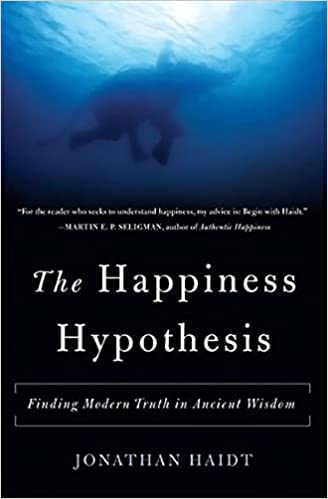
Best quote from this book
“Each of us thinks we see the world directly, as it really is. We further believe that the facts as we see them are there for all to see, therefore others should agree with us. If they don’t agree, it follows either that they have not yet been exposed to the relevant facts or else that they are blinded by their interests and ideologies.”
The reason you should read this book
This book takes a unique look at the brain factors that affect happiness. Haidt uses the iconic allegory of a rider on an elephant rather than wallowing in medical jargon. The analogy demonstrates how we can use our brains to enhance our happiness. More importantly, you’ll discover how to create mental and social habits that promote lasting happiness.
5. the happiness trap by Russ Harris
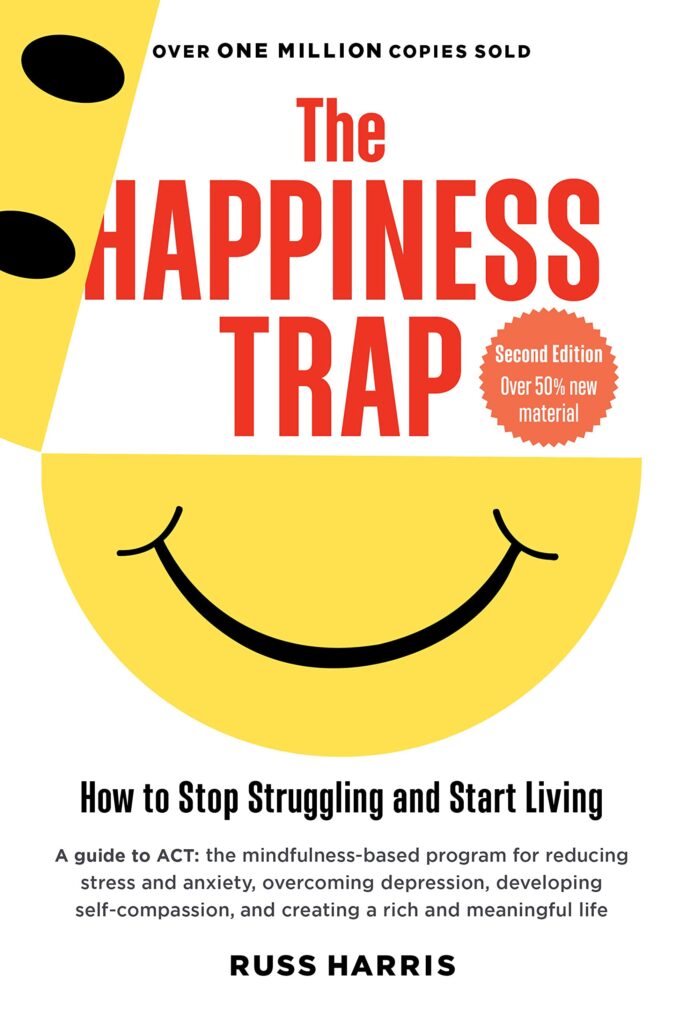
Best Quote From This Book
“Psychological flexibility is the ability to adapt to a situation with awareness, openness, and focus and to take effective action, guided by your values.”
The reason you should read this book
Coaches, psychologists, physicians, and other healthcare professionals are trained in the application of mindfulness by Dr. Russ Harris, a physician with a specialty in stress management. This self-help book is simple to read and was released in 2013.
ACT is introduced in the inspirational and useful book “The Happiness Trap” (Acceptance and Commitment Therapy). ACT is a relatively new method of psychotherapy that was created as a result of groundbreaking behavioural psychology research.
The core of ACT is a mindfulness-based technique created to reduce stress, face anxieties, and discover fulfilment. An international bestseller, Harris’ book has been released in 22 different languages and more than 30 different nations.
6. the power of no by james altucher
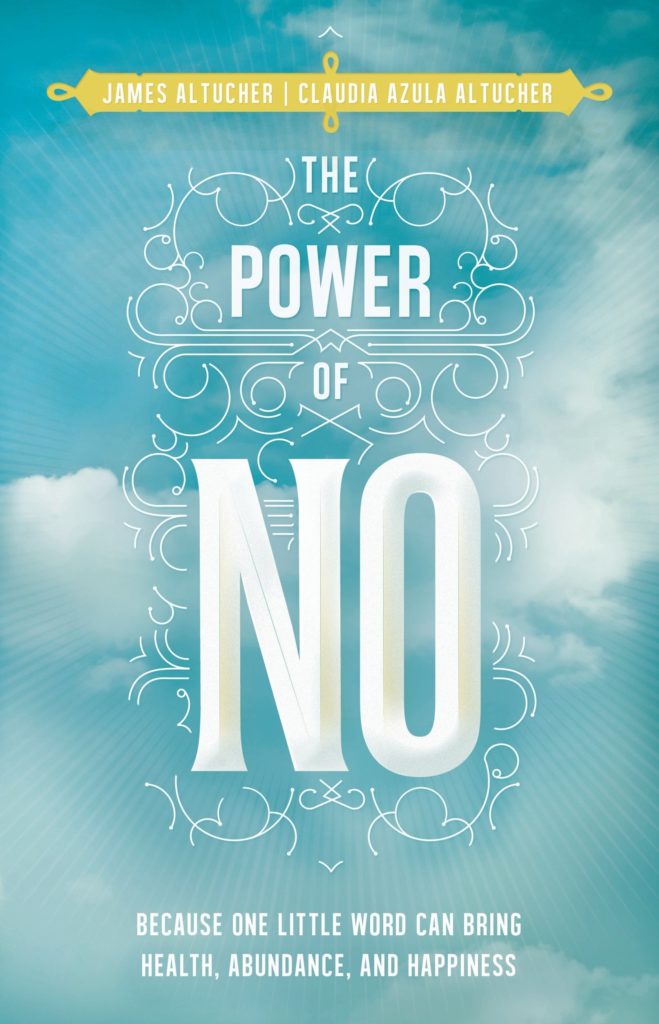
Best quote from this book
“Being grateful is the bridge between the world of nightmares and the world where we are free to say no. It’s the bridge between the world of delusions and the world of creativity.
It’s the power that brings death back to life, the power that turns poverty to wealth and anger to compassion.”
Although there are many suggestions on how to say no, the focus of this book is not ultimately on doing so. The value of this book is in teaching you to let go of things that aren’t necessary in your life so that you can say yes to yourself. It is jam-packed with useful advice for removing the things from your life that are weighing you down and will help you feel happier and more liberated.
7. happiness is an inside job by Sylvia Boorstein
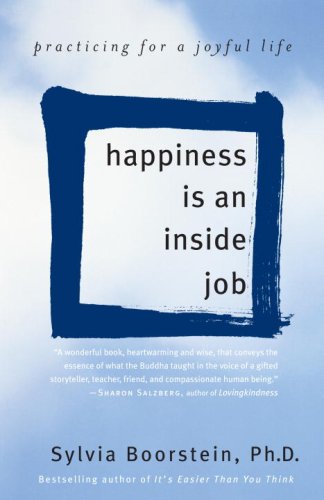
Best quote from this book
“Effort, concentration, and mindfulness are the internal ways in which the mind restores itself from being out of balance and lost in confusion to a condition of ease, clarity, and wisdom NO external action needs to happen“
The co-founding teacher and licenced psychotherapist at the Spirit Rock Meditation Center in Woodacre, California, is Sylvia Boorstein, Ph.D.
Her best-selling works include “Pay Attention, for Goodness’ Sake,” “It’s Easier Than You Think,” “Don’t Just Do Something, Sit There,” and “That’s Funny, You Don’t Look Buddhist.” She frequently speaks at psychological conferences and training seminars.
Boorstein gives kind and sage counsel in this motivational book. She investigates how we can still experience happiness despite the fact that the odds are stacked against us. Boorstein has observed through her work spanning three decades that cultivating and fostering kindness is the “key” to happiness.
She contends that kindness to others, including our selves, those we don’t know well, and even those we don’t particularly like, is the key to finding pleasure.
8. how to stop worrying and start living by dale carnegie
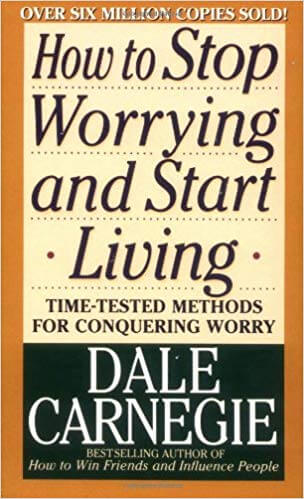
Best quote from this book
“When we hate our enemies, we are giving them power over us: power over our sleep, our appetites, our blood pressure, our health, and our happiness.”
This book is a classic when it comes to figuring out how to remove obstacles to happiness. Nobody enjoys worrying; it kills delight, although worrying can have a variety of causes. This book, which has sold six million copies, will assist you in overcoming all types of unfavorable feelings, including perplexity, tension, grief, and criticism.
9. the happiness equation by Neil Pasricha
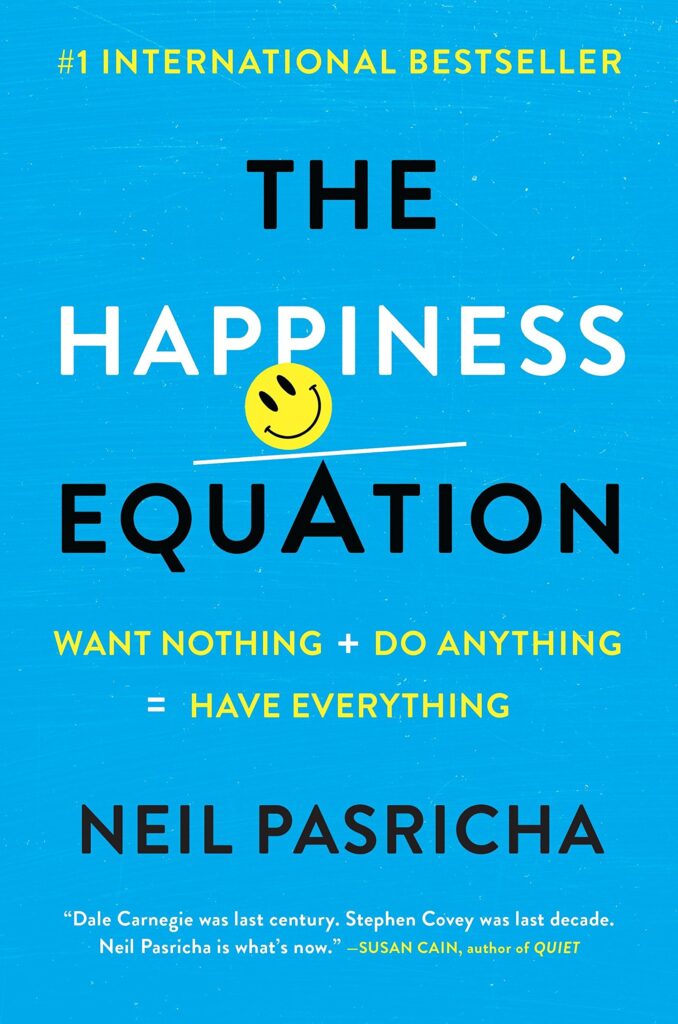
Best quote from this book
“Just keep learning, keep changing and keep growing and promise me that you will never retire.”
This book, according to QUIET author Susan Cain, is “a two-hour ticket to improving your life.” The “Book of Awesome” series is written by Pasricha, a best-selling author on the New York Times.
He created the Institute for Global Happiness, has an MBA from Harvard, and is a TED speaker who is extremely well-liked.
The nine keys of happiness are revealed in “The Happiness Equation,” which also demonstrates to readers that in order to “have everything,” one should want nothing and do anything! This book, which has been called paradoxical, is also rather contentious.
In order to uncover the secrets of happiness, Pasricha flips a conventional ideal on its head and presents it in a completely different context. The author then provides detailed instructions on how to implement each secret in order to live a happier life, including handwritten notes.
10. hardwiring happiness by rick hanson
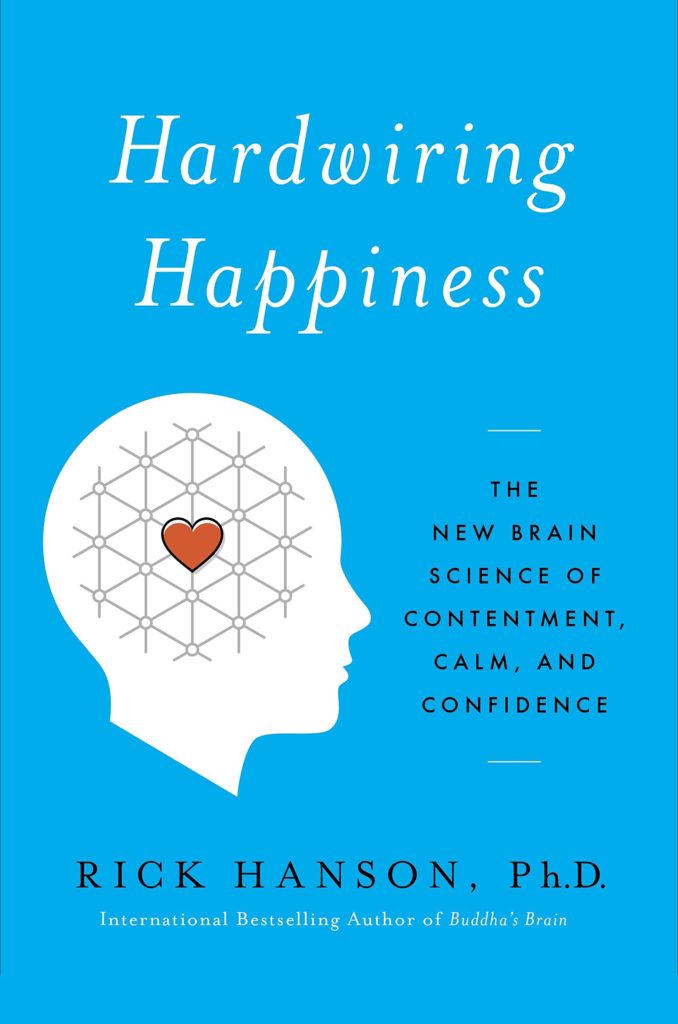
Best quote from this book
“Even if you, like me, have done things worthy of remorse, they do not wipe out your good qualities; you are still a fundamentally good person.”
It’s simple to become fixated on the bad. If you examine what is currently taking place in your head, you will immediately discover a number of things that “do not work.” Hanson assists us in altering these habits by helping us understand why we dwell so much on negative incidents and emotions. He says that for negative events, our brains are like Velcro, and for positive ones, they are like Teflon. His advice can help your positive memories linger while making your bad recollections disappear like water off a duck’s back.
If You find this post helpful then check out some book summaries available on growthex
- Rework Book Summary
- Master your emotions book summary.
- Think and grow rich book summary.
- Limitless Book Summary.
- No Excuses by brian tracy book summary.
- Inner Engineering book summary.
- Grit The Power Of Passion.
- Life’s amazing secrets book summary.
- How to attract money book summary.
- How to stop worrying and living.
- The parable of pipeline book summary.
- To Watch great book summary explanation videos in Hindi language then visit : This YOUTUBE channel